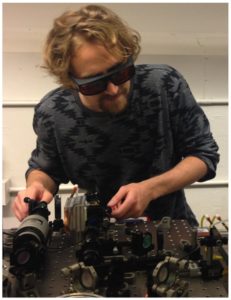It’s not every day that one has the opportunity to meet a Nobel Prize winner – let alone a whole room full of them. Later this month, Zak Burkley, a Ph.D. student in physics in the College of Natural Sciences, will have just that chance.
Lindau Nobel Laureate Meeting

He was chosen for a coveted place at the annual Lindau Nobel Laureate Meeting in Germany, taking place later this month. There he will be among some 400 promising young scientists from around the world to meet, hear from, and exchange ideas with 30 Nobel Laureates. Among the Laureates in attendance will be Takaaki Kajita and Arthur McDonald, who shared the 2015 Nobel Prize in Physics for their discovery of neutrino oscillations.
Burkley’s selection is a great honor, but it is perhaps little surprise for those who know his sharp focus well. Many around campus already know him from his initiation of the Physics on Tap public lecture series which takes place at local Fort Collins Pateros Creek brewing company.
New ways to study hydrogen
For his Ph.D., Burkley is developing new ways to study hydrogen, and potentially anti-hydrogen – its antimatter analog – using lasers. It is a hot topic, especially with the new ability at CERN – the world’s largest particle physics laboratory – to produce anti-hydrogen. But studying the stuff actually requires supercool temperatures.
So Burkley, advised by Assistant Professor Dylan Yost, works with high-powered ultraviolet lasers in hopes of being able to test predictions that have, until now, been purely theoretical. More specifically, with his lasers, scientists should be able to cool hydrogen and anti-hydrogen enough to measure the tiny differences between the two. And that might eventually help to explain why our universe is dominated by matter – rather than antimatter.
But what matters for now is Burkley’s upcoming week with some of the greatest living minds in science.